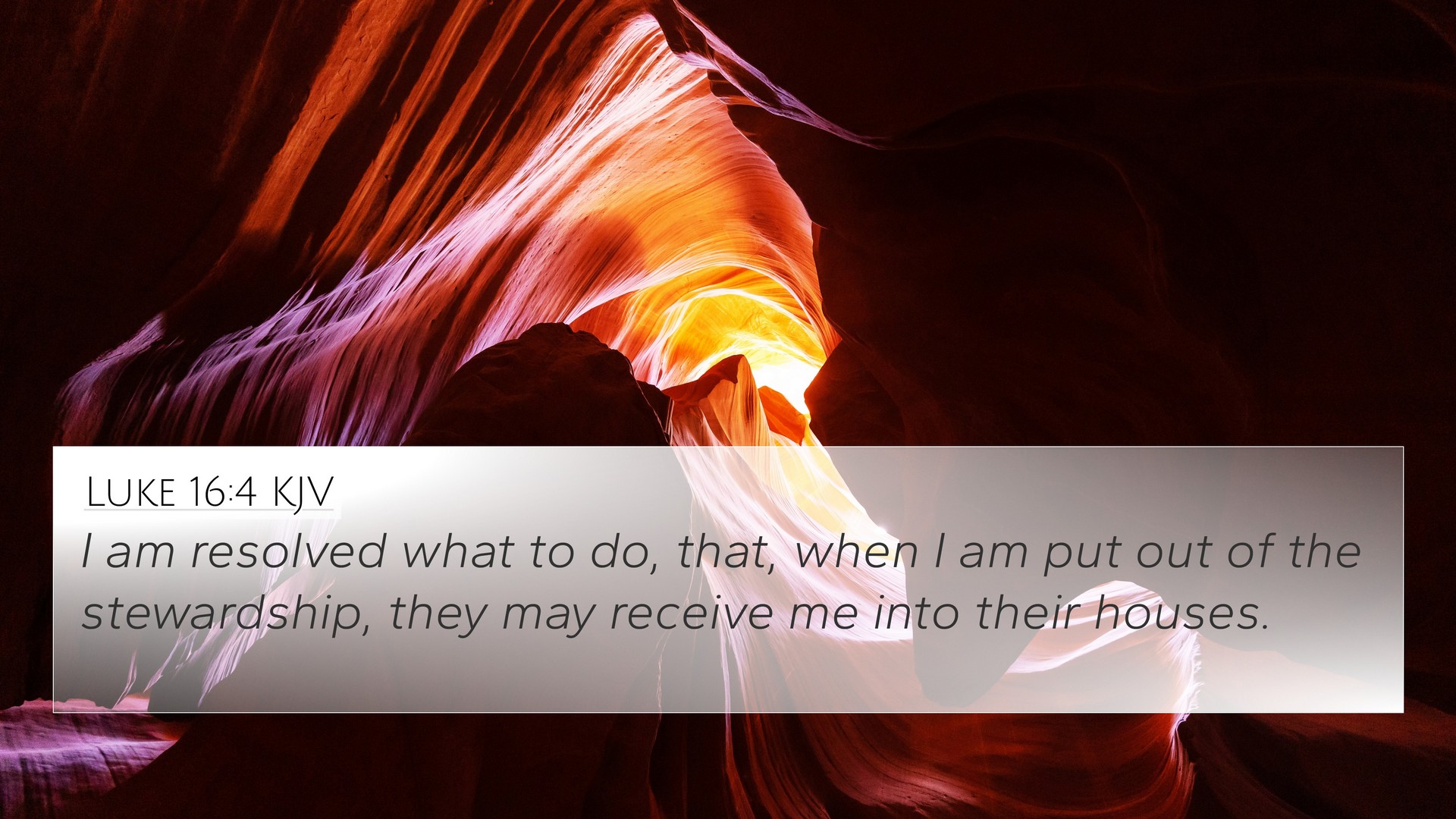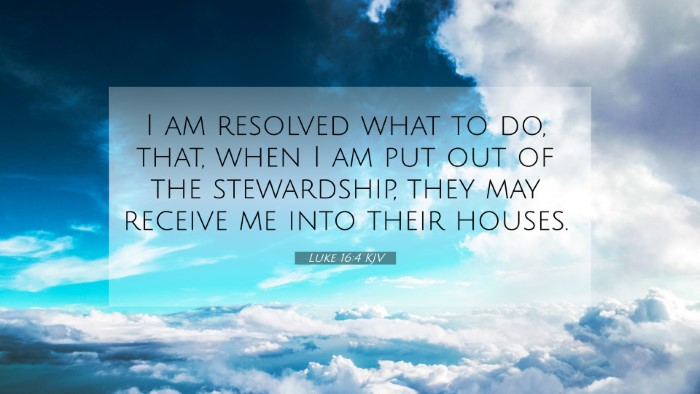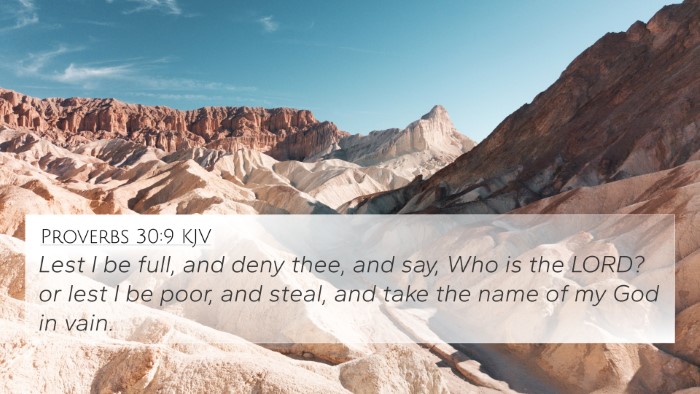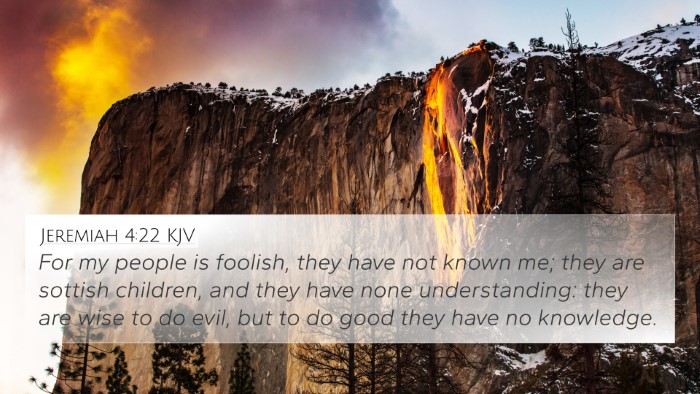Understanding Luke 16:4
Luke 16:4 states: "I am resolved what to do, that when I am put out of the stewardship, they may receive me into their houses." This verse occurs in the context of the Parable of the Unjust Steward, illustrating themes of shrewdness and preparation for the future.
Verse Interpretation
The steward, who was facing dismissal, reflects on his situation with pragmatic foresight. His actions represent a self-serving wisdom as he seeks to prepare for his impending job loss. Here, the steward is keenly aware of his limitations and acts not out of greed but survival instincts.
Commentary Insights
-
Matthew Henry:
Henry highlights the steward's quick thinking as wisdom in self-preservation, noting that while his actions are deceitful, they reflect a clear understanding of his precarious situation.
-
Albert Barnes:
Barnes explains the thematic significance of the steward's resolution; he recognizes that even in his wrongful dealings, he is securing his future by fostering relationships with others who may help him afterward.
-
Adam Clarke:
Clarke discusses the moral implications of the steward's actions, suggesting that although the steward acted unrighteously, he demonstrates cleverness that even the children of light could learn from in terms of preparation and resourcefulness.
Bible Cross-References
To deepen our understanding of Luke 16:4, we can consider the following related Bible verses:
- Proverbs 22:3: "A prudent man foresees the evil and hides himself; but the simple pass on, and are punished."
- Matthew 10:16: "Behold, I send you forth as sheep in the midst of wolves: be ye therefore wise as serpents, and harmless as doves."
- Luke 12:54-56: "And he said also to the people, When ye see a cloud rise out of the west, straightway ye say, There cometh a shower; and so it is. And when ye see the south wind blow, ye say, There will be heat; and it cometh to pass."
- Luke 16:8: "And the lord commended the unjust steward, because he had done wisely: for the children of this world are in their generation wiser than the children of light."
- 1 Chronicles 12:32: "And of the children of Issachar, which were men that had understanding of the times, to know what Israel ought to do."
- James 1:5: "If any of you lack wisdom, let him ask of God, that giveth to all men liberally, and upbraideth not; and it shall be given him."
- Ecclesiastes 7:12: "For wisdom is a defense, and money is a defense: but the excellency of knowledge is, that wisdom giveth life to them that have it."
Thematic Reflections
Luke 16:4 serves as a reminder of the importance of discernment and foresight in both worldly and spiritual endeavors. The wisdom illustrated by the steward can lead to discussions about:
- Stewardship: The biblical principle of managing what God has entrusted to us effectively.
- Wisdom vs. Folly: The contrasts between righteous decisions versus self-seeking behavior.
- Preparation: The necessity of preparing for the future in light of inevitable changes, whether in personal life or in spiritual accountability.
Connections Between Bible Verses
By exploring the connections between this and other verses, we can see the broader scope of biblical teaching regarding prudence and integrity:
- Proverbs 3:5-6: "Trust in the LORD with all thine heart; and lean not unto thine own understanding. In all thy ways acknowledge him, and he shall direct thy paths."
- Romans 12:12: "Rejoicing in hope; patient in tribulation; continuing instant in prayer."
- Philippians 4:19: "But my God shall supply all your need according to his riches in glory by Christ Jesus."
Scriptural Cross-Referencing Techniques
For those wishing to engage deeply with the Scriptures, consider the following tools and methods:
- Using a Bible Concordance: To locate related themes or specific verses across the Bible.
- Bible Cross-Reference Guide: Resources that map out thematic connections between different books of the Bible.
- Verse-by-Verse Comparisons: In-depth studies comparing contexts and messages of adjacent scripture passages.
- Methodological Approaches: Utilizing thematic study methods for a comprehensive understanding of biblical books.
Conclusion
In sum, Luke 16:4 challenges readers to employ wisdom and prudence in all affairs. The commentary from esteemed theologians provides valuable insights that encourage believers to reflect on their own stewardship and readiness for change. Engaging with cross-referencing techniques allows for a more profound and interconnected understanding of biblical teachings, enhancing our spiritual journey.





